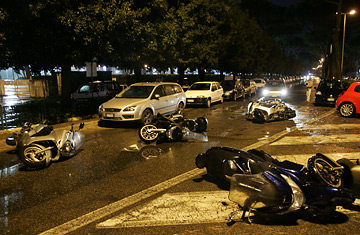
Damaged motorbikes near the Olympic stadium following clashes between Lazio's soccer fans and policemen.
The violence that has long plagued the Italian soccer league left another victim dead on Sunday, shot at a highway rest stop, and dozens of police and team supporters injured in subsequent rioting. Gabriele Sandri, a 26-year-old fan of the Rome-based team Lazio, was shot through the neck Sunday by a highway police officer at a Tuscan branch of the Autogrill restaurant chain after a brawl erupted between their fans and the Juventus supporters who'd crossed paths on their way to their respective teams' road games in different cities. The bad news about the shocking incident is that no one is truly shocked.
The death of the fan, a popular DJ in Rome night clubs, is indeed the "senseless tragedy" that commentators are calling it. Police say the officer's pistol went off accidentally while running after the car that Sandri and friends were fleeing in after taking part in the fight. Of course no one should die in such circumstances, and the judicial process should determine the full extent of police culpability. But the outrage should run both deeper, and wider. It should begin with the fact that the kind of violence that erupted in and near stadiums after news of Sandri's death emerged has become as much of a consistent ritual in Italy as a morning espresso. While the country's sports "intelligentsia" debated whether all games should have been suspended on Sunday, no one doubted that mayhem would break loose. And it did: so-called fans in the northern cities of Milan and Bergamo fought with police, while their counterparts in Rome, some of whom cover their faces with the scarves of the sides they follow, attacked a police station and the national headquarters of the Italian sports federation, and set a nearby bus and several cars on fire.
Though it often takes loss of life to catch our attention, these scenes of violence have been occurring on a near weekly basis at stadiums from Turin to Taranto — for years I got to know this Italian version of the hooligan (dubbed Ultra) while covering the Serie A league for the Associated Press seven years ago. Even when it didn't make the headlines, virtually every week we would file an "Italian Violence Roundup" alongside the coverage of the games. There were also spot stories to file on racist chants and anti-Semitic banners in stadiums. An in-depth report on the ills of the Italian game also included a visit in southern Rome to Lazio fan headquarters, adorned with Fascist-era Celtic crosses and photographs of Benito Mussolini. When I arrived with an AP photographer, a leader of the "Irrudicibile" rooting section refused to talk to me, made the photographer turn over his film, and accused my bearded colleague of "looking like a leftist" as he ordered us out the front door.
When the violence does finally manage to bump the on-field highlights off the front page, a chorus of shock and outrage inevitably follows. But on and off the field, this is a country with a gift for creating dust storms that are bound to change nothing once the proverbial dust has settled. The last fatality was in February when a 38-year-old police officer, Filippo Raciti, was killed by a teenage fan in Catania during rioting at the stadium in the Sicilian city. After the death, there was much talk of applying the same techniques that the English Premier League have used to stamp out violence, with more control by stewards in the stadium and swifter punishments such as enforcing legal sentences and banning people from attending games. There are some signs that clashes have been reduced, as figures released by the government confirm. Still, the basic dynamic in Italy has not changed: organized fan clubs, which hold virtual blackmail power over team owners (they're scared of the threat of violence and other organized protests), are ready to clash with the heavy police presence lined up at stadiums every weekend. And on any given Sunday, more blood is shed between hooligans and money wasted due to costs incurred by the high police bill.
Dissecting the problems in soccer are not simple, especially because it often appears to be pure nihilism. But as with any other group prone to violence, the technique of "draining the pond" must be applied by the Italian government: organized fan clubs that are violent must be disbanded, rowdy fans must know that any involvement in these incidents is a ticket to a long-term stadium ban, and the majority of good-natured fans should understand that the "nuclear option" of having games take place behind closed doors is very much on the table. That was the message on Sunday afternoon from Marisa Grasso, the widow of Raciti, the officer killed in Catania earlier this year. "My husband's death posed a basic question: if it is right to let people go to the games or if it is necessary and inevitable that they can only be seen on TV." Despite all the hand-wringing, no one this time has mentioned the idea proposed after Raciti's death: a year or more of empty stadiums. That would help remind Italians that they need their national game as much as it needs them.
